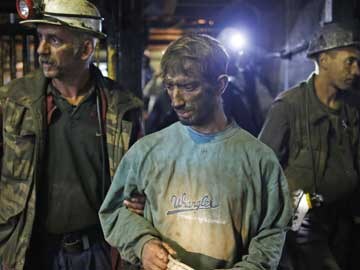
Injured miners leave the Raspotocje coal mine, which collapsed due to an earthquake, in Zenica .(Reuters)
Sarajevo:
Rescuers recovered late on Sunday the body of the last of five Bosnian miners who were killed after an earthquake triggered a collapse at the central Raspotocje mine and trapped 34 miners half a kilometre below the surface.
In the third such accident this year, a 3.5-magnitude earthquake on Thursday near the central Bosnian town of Zenica caused rocks in the mine to fracture explosively, sealing off the miners in an underground passage.
Twenty-nine miners were pulled out alive within the first 24 hours and the bodies of four of the dead were recovered on Saturday.
After digging for 80 hours through tight underground corridors filled with methane, emergency teams on Sunday night reached the body of the last miner who was buried under piles of earth, said mine manager Esad Civic.
A joint prayer for the five men and the burial will be held later on Monday in Zenica. A day of national mourning was declared in Bosnia's autonomous Bosniak-Croat Federation, where the mine is located.
Nuraga Duranovic, the Federation chief mining inspector, said the miners most probably suffocated from poisonous gases released in the air after the rock burst.
Sixteen people have been injured in previous accidents this year, and experts say that Raspotocje is the most dangerous of all Bosnia's coal mines because of frequent rock bursts caused by tremors at its deep underground pits. Thirty nine 39 miners died in a rock burst at the mine in 1982.
Raspotocje produces coal for Bosnia's largest power utility,
EPBiH, and employs 430 miners.
The mine had been among the best equipped in the region before the collapse of Yugoslavia in the 1990s, but was damaged by shelling in the Bosnian war and has not been substantially upgraded since.
In 2009, the Federation government merged seven coal mines,
including Raspotocje, with EPBiH to supply its coal-fired
plants, and the utility pledged to invest more than 200 million
Bosnian marka ($135 million) over five years to improve
working conditions.
It has so far spent 140 million marka, but Raspotocje has
seen little of that.
Some of the miners who survived the Thursday's accident have said they would not return to work.
Civic said that management and trade union would request additional funding and investment from EPBiH to improve the work conditions and safety of miners at Raspotocje.
In the third such accident this year, a 3.5-magnitude earthquake on Thursday near the central Bosnian town of Zenica caused rocks in the mine to fracture explosively, sealing off the miners in an underground passage.
Twenty-nine miners were pulled out alive within the first 24 hours and the bodies of four of the dead were recovered on Saturday.
After digging for 80 hours through tight underground corridors filled with methane, emergency teams on Sunday night reached the body of the last miner who was buried under piles of earth, said mine manager Esad Civic.
A joint prayer for the five men and the burial will be held later on Monday in Zenica. A day of national mourning was declared in Bosnia's autonomous Bosniak-Croat Federation, where the mine is located.
Nuraga Duranovic, the Federation chief mining inspector, said the miners most probably suffocated from poisonous gases released in the air after the rock burst.
Sixteen people have been injured in previous accidents this year, and experts say that Raspotocje is the most dangerous of all Bosnia's coal mines because of frequent rock bursts caused by tremors at its deep underground pits. Thirty nine 39 miners died in a rock burst at the mine in 1982.
Raspotocje produces coal for Bosnia's largest power utility,
EPBiH, and employs 430 miners.
The mine had been among the best equipped in the region before the collapse of Yugoslavia in the 1990s, but was damaged by shelling in the Bosnian war and has not been substantially upgraded since.
In 2009, the Federation government merged seven coal mines,
including Raspotocje, with EPBiH to supply its coal-fired
plants, and the utility pledged to invest more than 200 million
Bosnian marka ($135 million) over five years to improve
working conditions.
It has so far spent 140 million marka, but Raspotocje has
seen little of that.
Some of the miners who survived the Thursday's accident have said they would not return to work.
Civic said that management and trade union would request additional funding and investment from EPBiH to improve the work conditions and safety of miners at Raspotocje.
© Thomson Reuters 2014
Track Latest News Live on NDTV.com and get news updates from India and around the world

